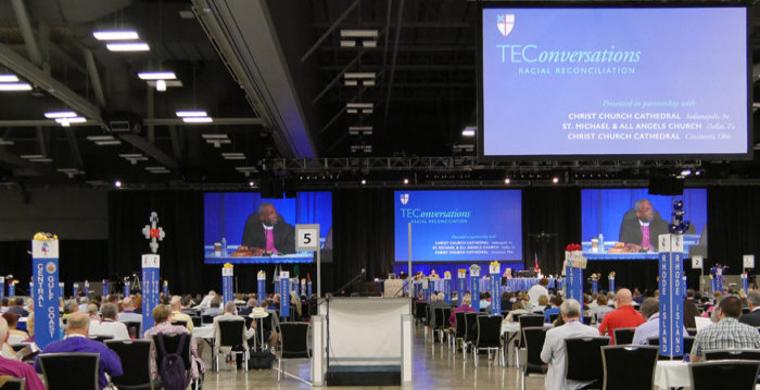AUSTIN, TX: Episcopalians Take Step Towards Revising Book of Common Prayer
BY JEFF WALTON
https://juicyecumenism.com/2018/07/07/book-of-common-prayer/
July 7, 2018
Clergy and lay deputies to the Episcopal Church's General Convention have taken a key step towards a comprehensive multi-year revision of the denomination's Book of Common Prayer (BCP). Such a revision may include gender-neutral language for God and same-sex marriage rites.
"We have been through a holy and hard process," described the Rev. Sam Candler, Deputy from the Diocese of Atlanta and chair of the committee which oversaw the legislation. Candler said the adopted resolution "takes us to a plan of a comprehensive revision of the Book of Common Prayer."
In vote by orders, the convention's House of Deputies adopted an amended version of Resolution A068, Plan for the Revision of the Book of Common Prayer, 63 for, 30 against and 17 divided in the clergy order and 69 for, 26 against and 15 divided amongst the lay order. Most of the 110 diocesan delegations have eight deputies, half of which are clergy and half are laity.
Amendments to the resolution include language specifying that revision will continue to adhere to the four tenets of The Chicago-Lambeth Quadrilateral. Deputies also voted that the church's Standing Commission on Liturgy and Music be joined by two members or representatives from Province IX of The Episcopal Church as part of the revision process. Province IX includes Spanish-speaking dioceses in Latin America and the Caribbean, most of which are more theologically conservative than the majority of U.S.-based dioceses.
Last revised in 1979, the BCP is used for worship in Episcopal Church congregations and includes services for celebrating the Holy Eucharist (communion), Marriage, and Baptism, among other rites. Alongside the hymnal, the most recent version of the BCP is found in the pews of most Episcopal parishes, although some retain the 1928 revision for a variety of reasons including theology and language.
Prayer Book revision has been among the more controversial topics at the church's triennial convention meeting in Austin, Texas July 5-13. Some deputies have advocated for gender-neutral language for God to be employed in the BCP, arguing that it makes the content more accessible and egalitarian. Other deputies oppose such changes, arguing that there is no groundswell of support among local parishes for a BCP revision. Others have questioned the practicality of pursuing such a major project during a time when the denomination faces significant decline in membership and attendance. The resolution appropriates $1,917,025 in total across the next three years for the revision process.
Officials from orthodox/traditionalist dioceses have expressed concern that prayer book revision could force dissenting dioceses to permit same-sex marriage. Currently, eight domestic dioceses do not permit such unions to be solemnized by their clergy or within their churches.
"Marriage for all has certainly been an issue for the church," Candler noted, adding that he was uncertain if a proposal scheduled for consideration the afternoon of Sunday, July 8 would be a part of BCP revision in the immediate future, "but it will be in the long run."
Deputies to the convention make up one house of a bicameral legislature, the other being the House of Bishops. Bishops would need to take the same legislative action before the convention adjourns on July 13 if the revision is to move forward at this time.
"If nothing passes successfully, then there is no resolution," Candler explained at the midday press conference following the House of Deputies vote. "But we have every hope that something will pass successfully."
"It's not a new concept, people have been talking about revision for years," recounted Candler, who serves as Dean of the Cathedral of St. Philip in Atlanta, Georgia. "There is a sense of love and liberation" on the floor of the House of Deputies.
If bishops concur with the deputies, "The next step is a deep listening process" to understand people's hopes and yearnings for the revision of the BCP, according to The Rev. Ruth Meyers, Alternate Deputy from Diocese of California.
Meyers is a professor at Church Divinity School of the Pacific, one of 10 recognized seminaries producing Episcopal clergy. She explained that the Standing Commission on Liturgy and Music will collect data from every congregation of the Episcopal Church including information about what worship is like in every congregation. A "listening process" will involve a conversation in each diocese.
"Pay attention and listen to what is coming out of the [local] diocese," Meyers advised to those interested in the revision process. "When that invitation comes, take them up on it and participate."
Asked about media attention focusing around BCP revisions to be gender-neutral, Meyers clarified that new "expansive language" is "a broadening of the images we use to express God.
"We use a narrow range of that [Christian tradition] right now," Meyers asserted. "Language about God as Father and Jesus as Son is a deep part of our tradition, and we look to expand that."
Meyers characterized the motivation to revise the BCP as "Expanding our language so that every person understands and can see that they indeed are created in the image and likeness of God."
"Book of Common Prayer revision could easily involve more than language of how we refer to God," Candler predicted. "Revision of the prayer book certainly is about expansive language, but it is also about proper stewardship and care of creation. How we see our salvation, atonement theology. There are lots of features that would represent the breadth of the Episcopal Church and our theology since 1979."
Asked what obstacles could be ahead for BCP revision, Candler joked "There will be no landmines, there will be beautiful surprises of the spirit."
END














